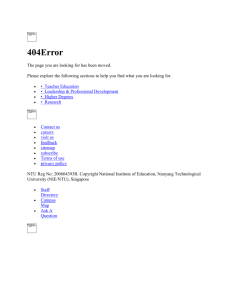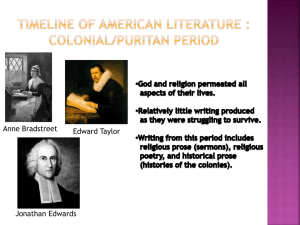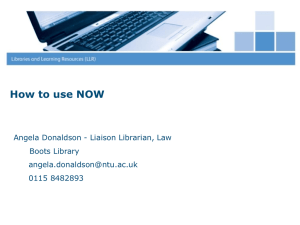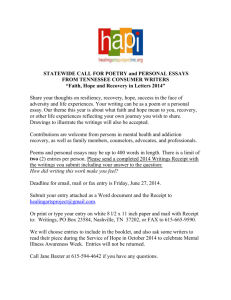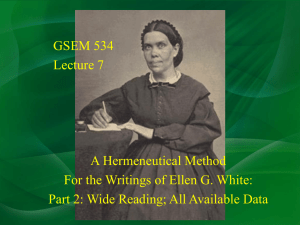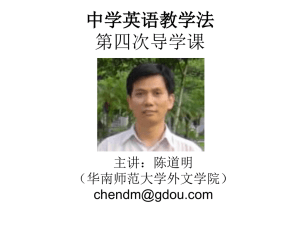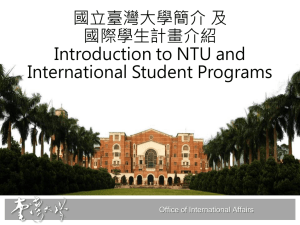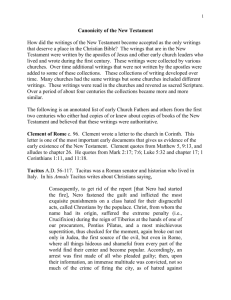NTU Guidelines for the Enhancement of Academic Research in
advertisement
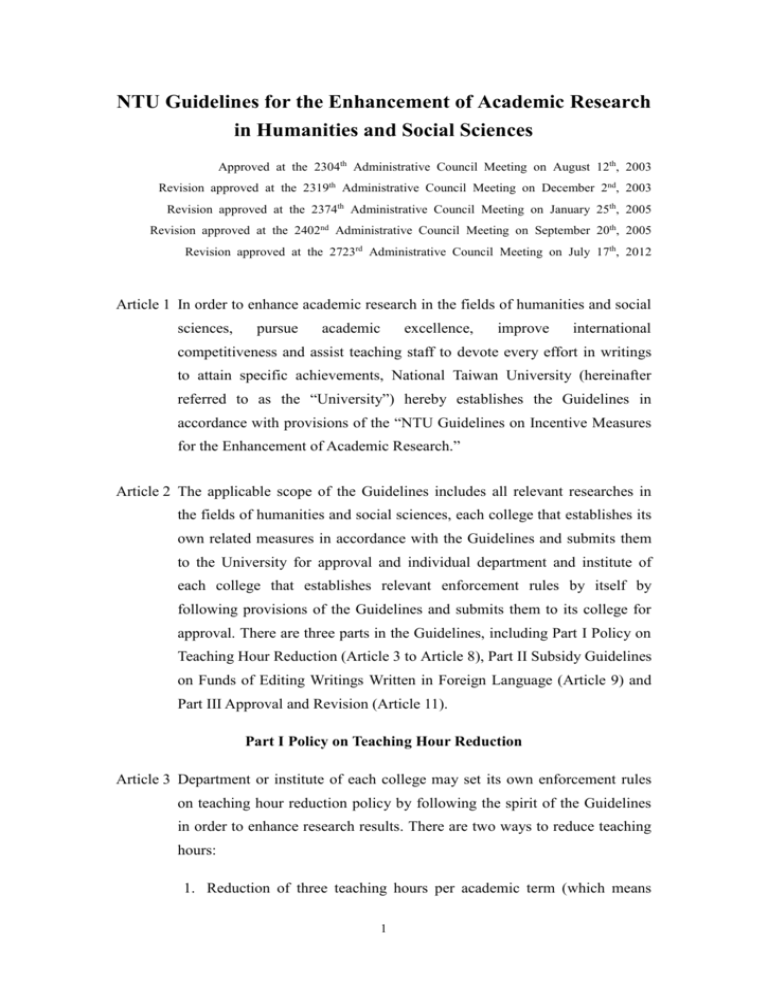
NTU Guidelines for the Enhancement of Academic Research in Humanities and Social Sciences Approved at the 2304th Administrative Council Meeting on August 12th, 2003 Revision approved at the 2319th Administrative Council Meeting on December 2nd, 2003 Revision approved at the 2374th Administrative Council Meeting on January 25th, 2005 Revision approved at the 2402nd Administrative Council Meeting on September 20th, 2005 Revision approved at the 2723rd Administrative Council Meeting on July 17th, 2012 Article 1 In order to enhance academic research in the fields of humanities and social sciences, pursue academic excellence, improve international competitiveness and assist teaching staff to devote every effort in writings to attain specific achievements, National Taiwan University (hereinafter referred to as the “University”) hereby establishes the Guidelines in accordance with provisions of the “NTU Guidelines on Incentive Measures for the Enhancement of Academic Research.” Article 2 The applicable scope of the Guidelines includes all relevant researches in the fields of humanities and social sciences, each college that establishes its own related measures in accordance with the Guidelines and submits them to the University for approval and individual department and institute of each college that establishes relevant enforcement rules by itself by following provisions of the Guidelines and submits them to its college for approval. There are three parts in the Guidelines, including Part I Policy on Teaching Hour Reduction (Article 3 to Article 8), Part II Subsidy Guidelines on Funds of Editing Writings Written in Foreign Language (Article 9) and Part III Approval and Revision (Article 11). Part I Policy on Teaching Hour Reduction Article 3 Department or institute of each college may set its own enforcement rules on teaching hour reduction policy by following the spirit of the Guidelines in order to enhance research results. There are two ways to reduce teaching hours: 1. Reduction of three teaching hours per academic term (which means 1 that 8 hours for professor, 9 hours for associate professor and assistant professor, and 10 hours for instructor are reduced to 5 hours for professor, 6 hours for associate professor and assistant professor, and 7 hours for instructor) is granted in order for the faculty member to devote every effort to research writings for a term of three years. The faculty member must submit research writing for evaluation upon expiry of three-year term. 2. A faculty member may select an academic term with no teaching at all within three years in order to spare no effort to research writing. The faculty member will conduct regular teaching without increased hours for the remaining five academic terms. If the above-mentioned three-year-tem research results pass college evaluation, the faculty member may apply for another teaching hour reduction plan in next phase one year later. Those whose research results are not endorsed by the college are barred from applying for another teaching hour reduction within three years. When submitting application for teaching hour reduction to the department or institute for evaluation, faculty member should enclose research writings plan for a term of three years and other relevant information. Those courses that are not offered due to reduction of teaching hour of the faculty member will be open and instructed by a part-time faculty member, including a hired part-time instructor without filling in a teaching vacancy, scheduled by the department or institute to supplement number of courses and teaching hours. The required funds shall be borne by the University. During the period of teaching hour reduction (the aforesaid Item 1 and Item 2 within three years), faculty members who are on reduced teaching hour plan must observe the following restrictions: No part-time teaching outside the University, and no teaching at the NTU School of Professional and Continuing Studies or other NTU professional studies programs; No concurrent employment at other public or private organization; Shall not carry out duties commissioned by other public or private organization; 2 Shall not accept research projects other than the one or ones approved for teaching hour reduction unless entrusted by the NSC; No NTU administrative duties allowed; Applicant is not eligible for temporary job transfer outside the University; May be exempt from NTU committee or conference delegate services; Faculty members who have less than three consecutive years of service after their last job transfer may not apply for another teaching hour reduction; Faculty members who have less than two consecutive years of services at NTU may not apply for the reduction plan; Those who are granted a reduction of teaching hours will not be compensated for any extra teaching hours. Article 4 The number of faculty members who do not teach at all for one academic term within three years as stated in Item 2 of Article III may not exceed 10% of the total number of faculty members in the department or institute (to be counted as one person if 10% is less than one person). The sum of faculty members having teaching hours reduced as stated in Item 1 and Item 2 of Article III of the Guidelines may not exceed 20% of the total number of faculty members in the department or institute for each academic term. The aforementioned percentages also are the upper limits of budget for hiring part-time instructors regulated by the University. In the event of special condition, with Dean’s approval, the percentage can be adjusted to be no more than 20% of the total number of faculty members in the college. If more than 20% is required, the situation should be reported to President of the University for evaluation. Article 5 Under limited quotas, the enforcement rules of teaching hour reduction established by each department or institute itself for the enhancement of research should include examination measures for the reduction plan application. These rules shall be submitted to the college for approval. Each department or institute shall review these applications by itself in accordance with the enforcement rules within budget range under the condition that part-time instructor can be hired. Basic principles of these 3 measures may include (but not limited to): 1. Teaching condition (including number of courses, teaching hours and teaching quality) in general is not affected. 2. Priority is given to faculty members who produce outstanding academic writings during the past three years. If academic writing does not meet certain requirements, the faculty member may not apply for teaching hour reduction. 3. Assistant Professors and Associate Professors have priority. 4. Young faculty members have priority. 5. Recipients of multiple NSC Research Project Grants in recent years have priority. 6. Faculty members who have never applied for this reduction benefit have priority. Among the aforesaid contents, Item 1 and Item 2 are indispensable requirements. The rest of the contents may be determined by each department or institute at its own discretion. Article 6 Faculty members applying for reduction of teaching hours as stated in Article III of the Guidelines must be evaluated by the colleges upon expiry of the three-year term. Each college shall set its own policy on evaluation measures. Basic principles are given as follows. Results of research writings include (but not limited to): 1. SCI, SSCI, A&HCI, TSSCI (formal and watch list), THCI (formal and watch list) and journal paper (including accepted paper but has not published); 2. Papers are published by other international journals recognized by official meetings of colleges (such as Faculty Evaluation Committee & Faculty Board Meeting) 3. Books are published by a publisher that has strict censorship on publications and the publisher is recognized by official meetings of colleges (such as Faculty Evaluation Committee & Faculty Board Meeting). (The applicant’s book that has not completed yet may also be taken into account. However, writing plan of the book should be enclosed and the book has been completed at least half of the planned 4 book and identified by inter-district accreditation.) Among various research results mentioned above, any faculty member who applies for reduction of teaching hours shall be the first author of a paper or book. If authors of a paper published on a journal are listed by alphabetical order, the applicant should provide description on contribution to the paper and the contribution should be recognized by Validation Team for Journal of Liberal Arts, Office of R&D. The minimum requirement for passing evaluation for a faculty member is to complete at least three research papers. The restriction shall not apply for the condition as stated in Item 3 of this Article. The results of a faculty member with teaching hours reduced within three-year term should exceed the results without reduction of teaching hours within three years. Article 7 If a department or institute has number of faculty members who have reductions on teaching hour for three consecutive years exceeding 15% of total number of faculty members, the department or institute when reaching its fifth full year must have improved ranking or maintaining its leading position in its field in the research results ratings performed by NSC national teaching and research institutions. Article 8 Each college should refer to the aforesaid details of each Article of the Guidelines and establish its own regulations on reduction of teaching hours in order to improve research quality, including enforcement rules for each department and institute as well as procedures and standards for evaluating research results. These regulations should be submitted to the University for approval. When application for teaching hour reduction submitted by faculty members of the college are reviewed and approved by the college, project plan of the three-year term research and other relevant information together with the application form should be submitted to the University requesting for funds subsidy. Part II Subsidy Guidelines on Funds of Editing Writings Written in Foreign Language Article 9 Each college may establish its own guidelines on hiring professionals to edit writings written in foreign languages by faculty members (including 5 conditions and examinations on funds of editing writings written in foreign languages, application and procedures, required budget, etc.) and submit the guidelines to the University for approval and enforcement. In principle, subsidy will not be granted for translating Chinese writings into foreign languages. However, the restriction shall apply to special conditions that are approved through certain processes by each college. Each college shall submit application for subsidy on editing writing fees and enclose relevant documents to the University at any time by following reporting measures to the University. Article 10 Budget quotas of subsidy for each college shall be determined by the University by referring to the approach proposed by each college. Part III Approval and Revision Article 11 The Guidelines have been approved by the Administrative Council Meeting and shall take effect on the date of promulgation. 6
